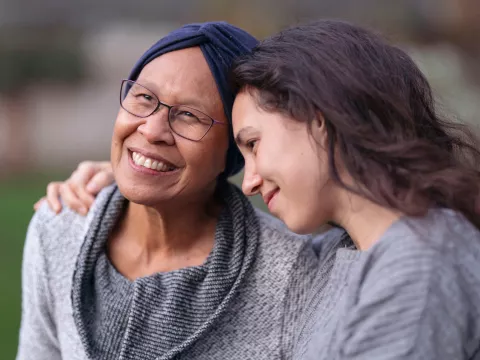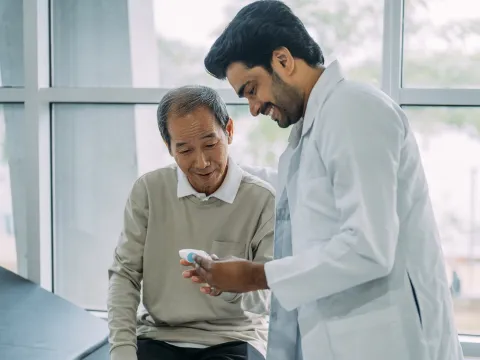- AdventHealth

Choose the health content that’s right for you, and get it delivered right in your inbox.
Though ovarian cancer is the deadliest cancer to impact women's reproductive systems, it doesn't have to be.
Of the women whose ovarian cancer is spotted early, 92% survive for more than five years. Unfortunately, if the cancer is found after it spreads, the survival rate drops to 30%.
These statistics can be anxiety-inducing, but we're sharing them to empower you. By knowing what symptoms to look for and your risk factors, you can take your health into your own hands and start treatment early.
So, what are the treatments for ovarian cancer? And what are the risk factors and warning signs? We're here to answer those questions.
Who’s at Risk for Ovarian Cancer?
There's no way to predict who will get ovarian cancer, though researchers have identified the people most likely to have it. Six factors that are associated with ovarian cancer risk include:
1. Age: The odds of developing ovarian cancer increase over time. Women ages 63 and older account for half of all ovarian cancer cases
2. Obesity: For women, a body mass index (BMI) of 30 or higher is considered obese. These women may have a higher risk than women with lower BMIs
3. Family history: Your risk is higher if you have a first-degree relative — a daughter, sister or mother — who has had ovarian cancer. The more relatives you have with this cancer, the higher your risk. A history of the disease in family members on your father's side is also linked to a higher risk. A family history of breast or colorectal cancer is associated with an increased risk for ovarian cancer. Women who have a family history of breast cancer sometimes opt to get checked for an inherited defect in their BRCA1 and BRCA2 genes. The flaw in either gene links to a high risk for breast cancer and ovarian cancer
4. Personal history: Women who have had colorectal, uterine or breast cancer may face a higher risk for ovarian cancer than those who have not had one of these other cancers
5. Pregnancy: Women who have their first full-term pregnancy after age 35 or never give birth have a higher risk. In fact, the more children women have, the less apt they are to get ovarian cancer. Breastfeeding may also lower your risk
6. Medications: According to some evidence, using estrogen-only hormone therapy after menopause may raise your risk
One or more of these risk factors is a good reason to talk to your doctor about ovarian cancer. However, everyone should be vigilant for symptoms regardless of preexisting risk factors.
Know Ovarian Cancer Warning Signs
Treatment is most effective when ovarian cancer is detected early. But symptoms are often vague and may not appear until later cancer stages. Easy-to-overlook red flags might include:
- Abnormal vaginal bleeding
- Back pain
- Belly swelling with weight loss
- Diarrhea, constipation, or frequent urination
- Fatigue
- Feeling full quickly
- Pain during intercourse
- Stomach discomfort, such as pain or bloating
Talk to your doctor if any of these symptoms are out of the ordinary for you and last for more than two weeks. The bottom line in spotting any reproductive system cancer is knowing your body and what is and isn't normal for you.
How is Ovarian Cancer Treated?
Treatment for ovarian cancer usually involves a combination of surgery and chemotherapy, according to the CDC.
Gynecologic oncologists can perform surgery on and give chemotherapy (medicine) to women with ovarian cancer. Your doctor can work with you to create a treatment plan.
Here are some of the treatment options for ovarian cancer:
- Surgery: Doctors remove cancer tissue in an operation
- Chemotherapy: Using special medicines to shrink or kill the cancer. The drugs can be pills you take or medications given in your veins, or sometimes both
- Targeted therapies: A type of cancer treatment that targets cancer cells to stop or slow the growth or spread of cancer cells. These drugs can be pills you take or medicines given in your veins. Your doctor may recommend genetic testing to find out which targeted therapy is right for you
- Different doctors on your medical team may provide different treatments:
- Gynecologic oncologists are doctors trained to treat gynecologic cancers, those that affect women's reproductive systems. They perform surgery and provide chemotherapy
- Surgeons are doctors who perform operations
- Medical oncologists are doctors who treat cancer with medicine (chemotherapy)
Whole-Woman Gynecologic Cancer Care, Close to Home
You are strong, capable and have a supportive team at your side. Let us partner with you in preventing, finding and treating cancers of the female reproductive system. We strive for whole-woman wellness, which attends to your body, mind and spirit.
Whether you're concerned about your risk or have received an ovarian cancer diagnosis, we support you on your journey to whole health.
Visit us here to learn more about ovarian cancer screening, detection, and treatment options.



